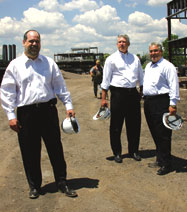Owners Push a Small New Jersey Firm Up The Food Chain
| The 2005 Top CM Firms, Top Design-Builders and Top Program Managers are free to ENR subscribers but each can be purchased for $14.95.
|
Working as an owners representative CMa niche that involves billing for hours workedhas its rewards and its frustrations. For Elizabeth-based Imperial, the frustrations include competing for contracts against a formidable lineup of veteran New York and northern New Jersey construction managers, such as Turner Corp. and Bovis Lend Lease, both international companies.
 |
| Jersey Guys. Lou Fernandez (left) handles CM and marketing, while Rich Briggs (center) manages bidding duties with CEO Frank Dominguez. (Photo by Guy Lawrence for ENR) |
Lou R. Fernandez, principal-in-charge of Imperials CM work and Dominguezs brother-in-law, sees the firm as a David battling the local Goliaths. "Its crazy competing with all these giants," says Fernandez. Yet Imperials current portfolio of CM and guaranteed-price work, concentrated heavily on school and municipal government projects, will produce about $52 million in revenue and support 95 employees.
As a result, Imperial, started by hard-working immigrants from Cuba, has blossomed into something of a small empire. The firm now is in the upper echelon of Hispanic-owned construction companies. A few years ago, Imperial set its sights on being the biggest Hispanic-owned contractor in the U.S. But observers say that distinction likely belongs to Azteca Enterprises Inc., a Dallas-based general contractor that had $72.5 million in 2004 revenue. More recently, Dominguez has stated that top-line growth is not his main goal in guaranteed-price work and that Imperial now prefers to be one of the top Hispanic-owned construction managers.
A pivotal period of the companys growth occurred during its eight years participating in the U.S. Small Business Administrations 8(a) program, when it transitioned from a $3-million-a-year electrical subcontractor into an $18-million-year general contractor. During that time, Imperial gained lots of experience in negotiating its scope and price with military and federal clients. Before graduating from the 8(a) program in early 2001, "we won almost every award" SBA had, boasts Dominguez.
Imperials road through the 8(a) program has been traveled by other rising Hispanic-owned contractors in the U.S., many of whom take big risks to get into the business and possibly bigger ones just to enter the country. "A common ingredient among many of our members is that they have been or are still in the 8(a) program," says Frank Fuentes, chairman of the U.S. Hispanic Contractors Association, Austin, Texas. Imperial is not a member, but association members also transformed themselves from specialty contractors to general contractors while in the 8(a) program, he says.
Starting Out
Imperial was started by Dominguez, 41, who grew up in Elizabeth, N.J. He inherited his interest in construction from his father, a former maintenance and electrical supervisor at Schering-Plough, the Kenilworth, N.J., pharmaceutical giant. Dominguez soon brought in Fernandez, whose family, like Dominguezs, also left Cuba in the 1960s and resided in Elizabeth, N.J. Dominguez then recruited Rich Briggs, his fathers colleague at Schering-Plough. The Passaic native is the third Imperial principal and oversees much of the companys guaranteed-price work.
As an electrical contractor, Imperial performed high-voltage work involving concrete and steel erection, experiences that would serve the firm well later on. In the 8(a) program, much of the firms work involved bidding but also negotiation of prices and early involvement on projects.
That opened a new world to Imperial that effectively moved the company "higher on the food chain," says Dominguez. While margins can be higher for specialty contractors, collecting payment always is a struggle, especially when the economy slows down as it did in the early 1990s, he says.
Dominguez and Fernandez took classes as part of the 8(a) program and quickly learned the basics of billing as an owners consultant, meeting owners needs and winning repeat business. Imperial also used the program to learn value engineering, says Griggs. All are keys to competing with industry giants. Imperial also competes against bigger firms by giving clients access to Imperials owners and by using project managers who are "ready to work" and wont be switched during the project says Dominguez.
New Jerseys multiple prime contractor law stimulates the need for construction managers to help run projects, say Fernandez and Dominguez. But it was the states $9.2-billion school building program, while exempt from the multiple prime contractor rule, that provided another big opportunity for Imperial once it graduated from the 8(a) program. The company currently has both guaranteed-price projects and construction management contracts with the Schools Construction Corp. (SCC), which runs the statewide program.
Construction management compensation in the U.S. as a percentage of a total project value varies based on the type of work. About 5 to 6% is typical, except for renovation, which is generally higher, says Bruce DAgostino, executive director of the Construction Management Association of America, McLean, Va. Industry sources say the billable rate varies from as low as $75 an hour to the $200-plus-an-hour range, depending on the service provided and the seniority of the staff member providing it. The maximum on schools is about 10%, generally what Imperial earns on its projects, say school and industry officials.
SCC has defined its schools-related construction management very broadly. The scope includes siting, land acquisition, design oversight and other up-front services, along with construction consulting in a detailed, cradle-to-grave package that can include several projects.
This arrangement of so-called "project management firms," or PMFs, suited SCCs need to start projects fast, says Donald E. Moore, managing director of the agencys design and construction division. After a state audit of its spending habits, SCC "is now looking at scaling back on the comprehensive nature of PMF contracts" and using more in-house staff, he says. "Imperial seems broader than when it got to the [schools] program three years ago."
 |
 |
| Search Engine. Imperial scans newspapers and the Internet to seek out local political developments that might give it an edge in competing for New Jersey CM jobs such as a Union County engineering building (top) and the city of Perth Amboys $40-million public safety complex. (Photo top courtesy of Imperial Construction Group; bottom by Guy Lawrence for ENR) |
Knowing More
In Moores opinion, "the more you know as a general contractor, the better you will work as a CM." Engineers and architects may disagree, but a CM that enters the field from the design side of the industry "doesnt fully understand activity in the field," he says. "The experience and pains of construction can help a firm manage better."
Although Imperial is sometimes counted toward meeting a minority-contracting goal and is a certified New Jersey minority business enterprise, Dominguez points out that its contracts rarely are counted toward such requirements. Fernandez says Imperial usually wins repeat business "once the door is opened" by a new client.
Among the services Imperial says it performs as an owners CM is stimulating contractors to bid on projects, a knack that comes from being a contractor itself. "We have an extensive database and follow a formula we have used before to stimulate interest, including calling local associations," says Fernandez. "We let an owner know how many people are going to walk through a project and we try to get out the vote." At an SCC project in Harrison, N.J., Fernandez says 40 firms came to a walk-through.
One current job and one still in development are of particular interest. The $40-million public safety complex in the old industrial city of Perth Amboy is one of a handful of projects in that town that include a major waterfront redevelopment. The complex was delayed for four months when its steel fabricator-erector declared insolvency, says Fernandez. City officials could not be reached for comment on the projects progress.
As it wins more prominent projects, Imperial hopes it can attract more deeply experienced staff. The Perth Amboy project was a better assignment for Charles Westhafer, Imperials senior project manager, than bigger companies may have offered him. A former employee of contractors Bechtel Corp. and Day & Zimmermann, he says Imperial has the feel of a company that is on the rise.
Imperial currently is signed up as an associate of New York City-based Tishman Construction Corp. to be construction advisors to the N.J. Sports & Exposition Authority on its proposed $1.3-billion Xanadu recreational complex in East Rutherford. Xanadu will be one of the biggest projects in the state. If it continues to find work on projects of that size and importance, Imperial will truly be on its way to forming a CM empire.
![]() click below for related links:
click below for related links:
- The Top 40 Program Mangers/Overview | Story | List |
- The 100 Design-Build Firms | Story | List |
- The Top CM Firms | Story | List |
- The Top CM-at-Risk Firms | Story | List |

